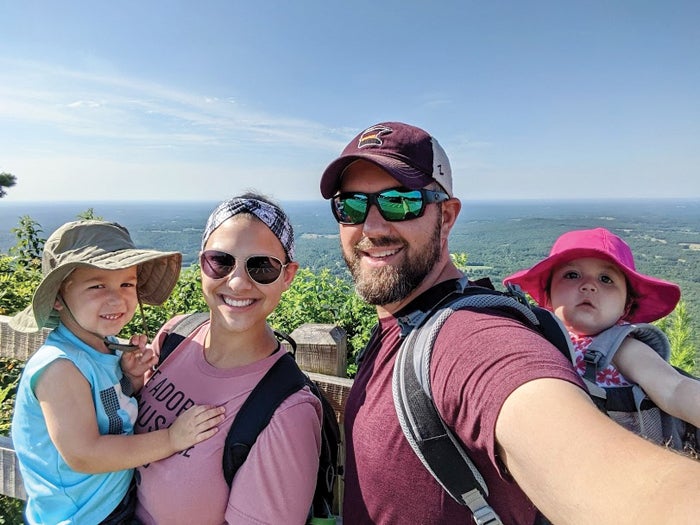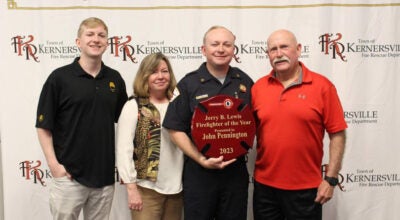How a Clemmons mom finds strength amid a battle with ovarian cancer
Published 12:00 am Thursday, September 24, 2020

- Katie Warren with her husband Wil and kids, Wilson, left, and Parker.
|
Getting your Trinity Audio player ready...
|
Reducing the stigma around gynecological cancers
By Gina DiPietro
Novant Health
One of Katie Warren’s most cherished blessings are her adopted kids, nearly 4-year-old Wilson and 14-month-old Parker.
But getting to this point has also been one of her biggest challenges.
Cancer prevented her from having children herself. And, it stood as a potential devastating barrier to her and husband, Wil, being able to adopt them. It was her resilience, in combination with the care from her medical team, that allowed her to move ahead to find the best life possible.
Her story also highlights the need to eliminate the stigma around gynecological cancers. Nearly 100,000 women are diagnosed with gynecological cancer each year, with an annual 30,000 deaths.
‘Something was wrong’
Warren’s battle with gynecological cancer began in 2012, when she was just 25 and experienced sharp pain in her lower abdomen. A trip to the emergency room and a CT scan revealed a mass on Warren’s ovary.
Her OB-GYN immediately referred her to Dr. Elizabeth Skinner, an oncologist who specializes in gynecological cancers, at Novant Health Cancer Institute — Winston-Salem. Skinner, along with Dr. Samuel Patrick Stuart Jr., a general surgeon at Novant Health, performed a complete hysterectomy, a bowel resection and removal of Warren’s appendix.
The diagnosis came post-surgery: Warren had stage three serous epithelial ovarian carcinoma. The surgery was followed by chemotherapy, which kicked her cancer into remission, only for it to return in 2014. Another surgery and additional rounds of chemotherapy were able to get the cancer under control by early 2015.
While the treatment plan was managing the disease, it had also eliminated Warren’s ability to carry her own children.
“It was frustrating because I always wanted to be a mom,” Warren said. “I felt like it was my fault that we couldn’t have kids. It was like a black cloud.”
And there was more: Katie’s history of cancer prevented many agencies from approving an adoption at all. But the Warrens say the adversity only strengthened their faith.
“I believe that God works all things together for the good of those who love him,” said Warren, who’s a nurse. “And in the moment of an uphill battle, it may not seem like what is happening is good, but there’s been good that’s come out of having cancer each time.” The couple, who live in Clemmons, was able to adopt their son, Wilson, in 2012.
Wilson’s arrival was followed by the birth of his baby sister, Parker, just a few years later. Both adoptions were open, meaning the biological and adoptive families were able to have contact. The Warrens were there to witness the birth of both children, with Wil cutting the umbilical cords and Katie being the first person to hold them.
“It’s such a special bond. It’s really a neat way to grow a family,” Warren said. “It creates this positive spin on the situation. Even though I did have cancer and can’t have my own kids, having a family wasn’t out of the picture for us.”
Warren, now 34, is again facing another challenge. Her ovarian cancer returned in late 2019. After experiencing “weird cramping sensations,” a CT scan showed tumor regrowth. Skinner explained that Warren’s type of cancer is atypical in that it doesn’t respond to certain treatments.
“It’s emerged through research that there is a special kind of ovarian cancer called low-grade cancer. These low-grade cancers behave differently than your standard — they tend to be more slow-growing and more commonly seen in young women like Katie,” Skinner said.
Reducing the stigma around gynecological cancers
Skinner also explained that ovarian cancer was once called the “silent killer,” as many women presented with advanced disease, with seemingly minimal symptoms.
“There are no screening tools that we have for ovarian cancer. So, the majority of women we see present with very vague symptoms — abdominal bloating, lack of appetite or filling up quickly, changes in bowel function such as constipation or bladder dysfunction,” Skinner said. “And oftentimes, they present at stage three or stage four, when the chance of a cure is much lower.”
Skinner said part of the problem is that people don’t talk about gynecological cancer. It can be a taboo subject.
“You hear somebody talking about their vagina and everybody just wants to cringe. I think that’s part of it. But I think the other thing is that breast cancer awareness, which has been a phenomenal feat by the Susan G. Komen Foundation, has kind of dwarfed all the other cancers. A lot of women are just not aware that there are other gynecological cancers,” Skinner said. “Even women who have it can feel isolated because they know a lot of people who have breast cancer, but they’re the only ones that have uterine cancer.”
To elevate the awareness of all types of gynecological cancers — cervical, uterine (or endometrial), vaginal, vulvar and ovarian — is September’s Gynecological Cancer Awareness Month.
Athena’s Run for GYN Cancers
While the awareness month helps elevate the status of these cancers, it’s also a catalyst to raise money for research dollars to help find better treatment options. Skinner and her team have organized an annual 5K, known as Athena’s Run for GYN Cancers, to help achieve that goal. Athena is the goddess of war, symbolizing the thousands of warriors battling gynecological cancers each day.
Since its inception in 2010, Skinner said the fundraiser has raised more than $500,000 — providing money for grants, cancer education and support groups.
“In addition to the much-needed research dollars, Athena’s Run has provided a community for gynecological cancer patients, so they understand they are not alone,” Skinner said. “They’ve got people cheering for them and fighting for them, even if those people don’t have cancer themselves.”
COVID-19 will prevent the run from happening this year, but the community can still show their support by “flocking the lawn” at the Novant Health Derrick L. Davis Cancer Institute in Winston-Salem, one of the largest cancer centers in the southern U.S. A $20 tax deductible donation will “adopt” a 26-inch flamingo, personalized with a teal ribbon bearing the name of the warrior you’ve chosen to remember, honor or support. To participate, go to https://www.athenasrun-ws.org/
‘It’s all about finding the good’
The Warrens have participated in Athena’s Run for many years, but Katie has also found her own way of offering support to other young women with cancer. She works with support networks, such as Teal Diva and Camp Koru, to connect with others going through a similar battle.
“It’s all about finding the good,” Warren said. “I’ve been able to help other young survivors through this journey. It’s always been helpful for me to have other young survivors to talk to and being that outlet for other people has been such a blessing.”



